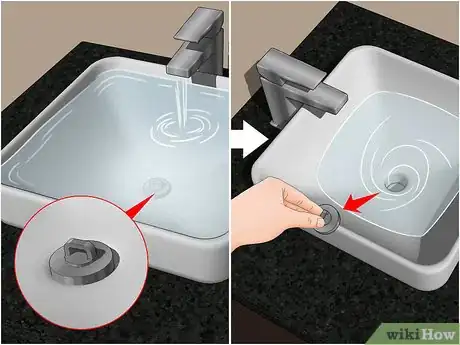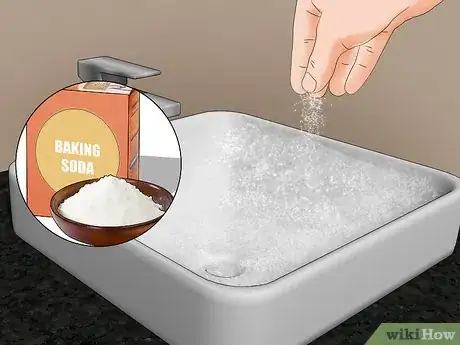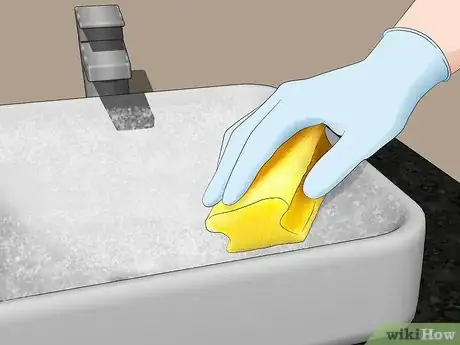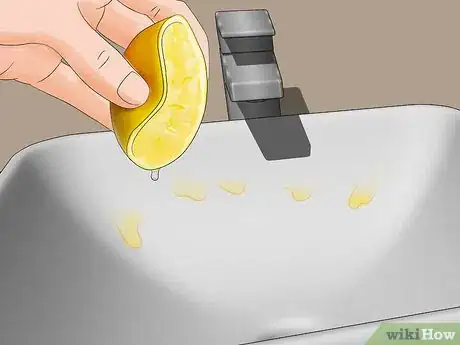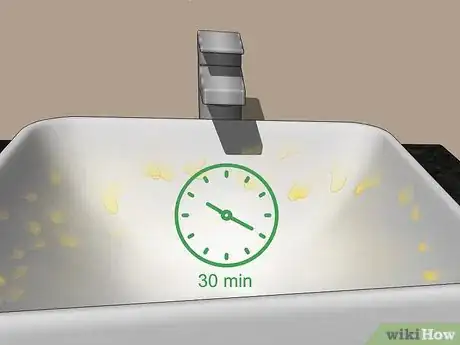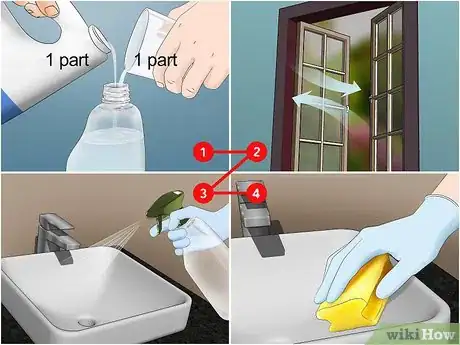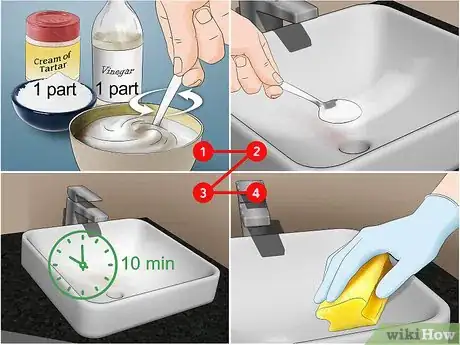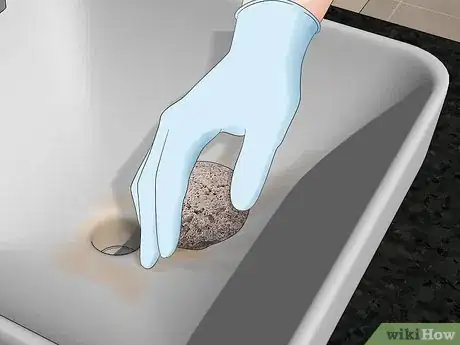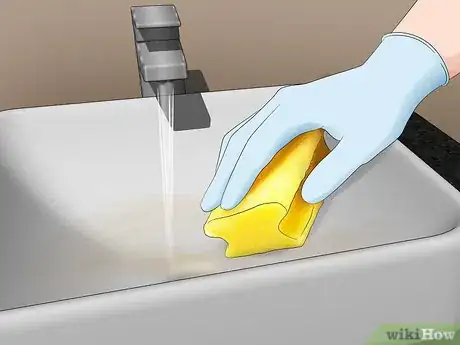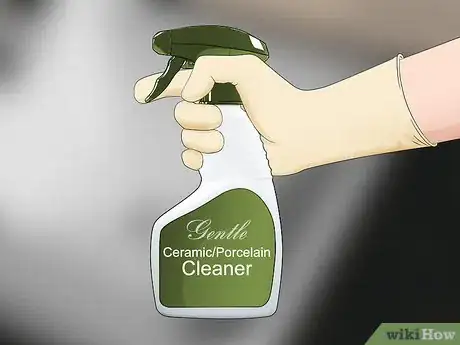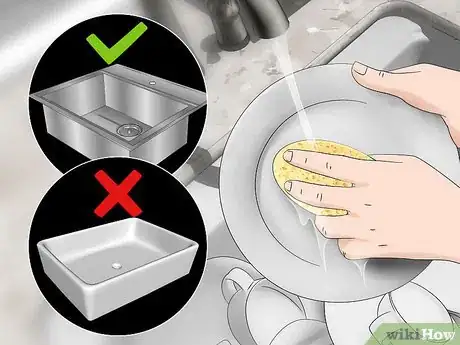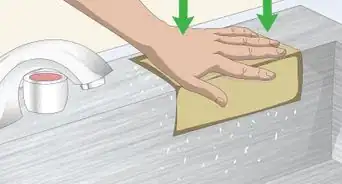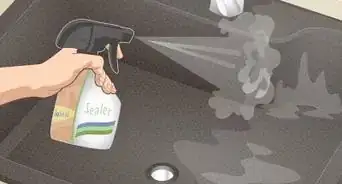This article was co-authored by Melanie Garcia. Melanie Garcia is the Co-Owner of Oranges & Lemons, a small, family cleaning business based in Downtown Los Angeles, California (DTLA) in operation for over 40 years. Oranges & Lemons operates while partnering with the National Domestic Workers Alliance and Hand in Hand: Domestic Employers Network.
This article has been viewed 82,105 times.
Ceramic sinks are common fixtures in bathrooms and kitchens, and are generally durable. However, they will become soiled and stained with regular use, and will need to be cleaned regular. You can do this using a mild abrasive like baking soda, or a more potent chemical like bleach. Plan to clean your ceramic sink monthly, to avoid stains and other dirty buildup.
Steps
Cleaning with Baking Soda and Lemons
-
1Dampen your sink. Before you apply the baking soda, lightly dampen the basin of the ceramic sink. You can do this by allowing the sink to fill with water and then draining it, or using your hand to splash water around on the sides of the basin. Make sure that no standing water is left in the sink, as this will dissolve the baking soda and render it useless.[1]
- Also dampen the sponge that you plan to clean the sink with. You don’t want the sponge soggy, so wring it out well before you start cleaning.
-
2Sprinkle baking soda into the sink. You can start by adding about ½ cup (0.25 liter). Use your fingers or a spoon to sprinkle the baking soda in the basin of the sink, until the ceramic has been fully coated. Make sure to apply baking soda to any areas that are soiled or stained.[2]Advertisement
-
3Scrub the baking soda with a damp sponge. Baking soda functions as a mild abrasive, and will be effective at cleaning mineral buildup, leftover toothpaste, and general dirt and grime off of the ceramic. Rinse the sponge as needed, and make sure to wring it out fully before you return to scrubbing the ceramic. Once you’ve cleaned the sink, rinse it well with water.[3]
- While you’re scrubbing, you should notice the baking soda clumping together into small lumps. This is a good sign: it means that the baking soda is not too wet, and that it’s effectively picking up dirt from your sink.
-
4Whiten the sink with lemon slices. To naturally “bleach” your ceramic sink, start by cutting a lemon into several wedges. Take each wedge and rub it around the basin of the sink, making sure to squeeze out plenty of lemon juice on the ceramic. You can use the tough skin of the lemon to scrub at stains or other darkened areas.[4]
- You’ll need to use at least four or five lemon slices to fully coat the ceramic with lemon juice.
-
5Let the lemon juice sit for 30 minutes. Once the ceramic is covered with lemon juice, let it sit for 30 minutes. This will give the natural acidity of the lemon juice time to break down stains. Once the lemon juice has set for half an hour, come back and rinse the sink out.[5]
- Throw away the remnants of the lemon rinds, or grind them up in your kitchen sink’s garbage disposal.
Removing Stains from the Ceramic
-
1Soak the sink with a bleach solution. In an empty plastic spray bottle, combine a 1:1 solution of bleach and water. Lightly shake the bottle to mix the solution. Open the window or turn on your bathroom fan before you start spraying the bleach solution, as this will provide ventilation. Then, spray the bleach solution over the entire interior surface of the ceramic sink. Let the bleach mixture sit and soak for about 10 minutes. Then, use a sponge or an old rag to wipe the sink clean.[6]
- Bleach is a strong chemical and can be very harmful if ingested or sprayed in the eyes. Use caution when spraying bleach, consider wearing safety goggles or at least rubber gloves, and wear clothing that you don’t care about.
- If there are young children in your house, make sure that they’re not near the sink when you’re spraying bleach.
-
2Apply cream of tartar and vinegar. If you would prefer to not use any chemical cleaners, you can remove stains from the ceramic with a mixture of cream of tartar and vinegar. Combine the cream of tartar and the vinegar at a 1:1 ratio in a small mixing bowl, and stir them together. Then, spoon some of the mixture onto the stains on your ceramic. Let this sit for about 10 minutes, and wipe clean with a sponge.[7]
- This method will also work if you substitute hydrogen peroxide for the vinegar. All three of these ingredients can be purchased at your local grocery store or supermarket.
-
3Scrub the stain gently with a pumice stone. Pumice stone is quite abrasive and can scrub stains off of your ceramic. Before using, run the pumice under water, and make sure that the stone stays wet while you’re rubbing out a stain. Then, lightly scrub at the stained area of your ceramic sink. The pumice should remove the discoloration.[8]
- Be careful when using this method. If you apply a pumice stone to a ceramic sink, the stone may scratch or damage the surface. Begin by rubbing gently, and stop if you see any scratches forming.
Protecting Your Sink from Scratches or Damages
-
1Wash the sink with a soft sponge. Although ceramic is a tough, durable material, it can still be damaged if scrubbed with an abrasive material. Do not use scouring pads to clean your ceramic sink, especially any pads made of wire or metal. Also do not use scouring powders to clean your ceramic sink, as they could scratch or damage the surface.[9] Instead of these, clean the sink with a soft, non-abrasive sponge.
- Some cleaning companies manufacture scouring liquids. Also avoid using these on the ceramic sink.
-
2Clean with a gentle, ceramic-specific product. Do not use concentrated drain cleaners in your ceramic sink. Although these products are advertised as being safe on all surfaces, a chemically potent concentrated drain cleaner may damage or erode the surface of your ceramic sink.[10] If you would like to use a drain cleaner, look for a gentler cleanser that is specifically designed for use on ceramic or porcelain.
- You may be more likely to find such a drain cleaner at a health store or a natural foods store.
-
3Wash dishes in the sink or in a metal container. Be careful to avoid washing dishes in large plastic bowls. Although the plastic bowls themselves will not harm the ceramic, the bowls will likely accumulate grit and dirt on their bottoms through normal use. This grit can scratch the surface of the ceramic on the bottom of your sink, and these scratches cannot be removed.[11]
- When you wash dishes, either fill the sink itself with soapy water, or find a large vessel that will not collect grit on its bottom. For example, use a large metal saucepan.
Expert Q&A
-
QuestionHow do you get stains out of a ceramic sink?
 Melanie GarciaMelanie Garcia is the Co-Owner of Oranges & Lemons, a small, family cleaning business based in Downtown Los Angeles, California (DTLA) in operation for over 40 years. Oranges & Lemons operates while partnering with the National Domestic Workers Alliance and Hand in Hand: Domestic Employers Network.
Melanie GarciaMelanie Garcia is the Co-Owner of Oranges & Lemons, a small, family cleaning business based in Downtown Los Angeles, California (DTLA) in operation for over 40 years. Oranges & Lemons operates while partnering with the National Domestic Workers Alliance and Hand in Hand: Domestic Employers Network.
Professional House Cleaner Try a mild cleanser like Bar Keeper's Friend. Rub the cleaner evenly over the ceramic surface. You can also scrub away stains and grime with a Magic Eraser sponge. Rinse the sink and repeat for any hard to remove stains.
Try a mild cleanser like Bar Keeper's Friend. Rub the cleaner evenly over the ceramic surface. You can also scrub away stains and grime with a Magic Eraser sponge. Rinse the sink and repeat for any hard to remove stains.
References
- ↑ http://www.rootsimple.com/2011/02/cleaning-the-sink-with-baking-soda-and-lemons/
- ↑ http://www.rootsimple.com/2011/02/cleaning-the-sink-with-baking-soda-and-lemons/
- ↑ http://www.rootsimple.com/2011/02/cleaning-the-sink-with-baking-soda-and-lemons/
- ↑ http://www.rootsimple.com/2011/02/cleaning-the-sink-with-baking-soda-and-lemons/
- ↑ http://www.rootsimple.com/2011/02/cleaning-the-sink-with-baking-soda-and-lemons/
- ↑ https://www.isavea2z.com/remove-stains-porcelain-sink/
- ↑ https://www.isavea2z.com/remove-stains-porcelain-sink/
- ↑ https://www.isavea2z.com/remove-stains-porcelain-sink/
- ↑ https://www.mom4real.com/clean-ceramic-sink/
About This Article
One way to clean your ceramic sink is to use baking soda, a soft sponge, and lemon juice. Use water to moisten your sink and sponge and then sprinkle 1/2 cup of baking soda all over the sink. Scrub the sink with your sponge until all debris has been removed and then rinse the sink with water. After it has been cleaned, brighten your sink by squeezing lemon juice all over and letting it sit for 30 minutes before rinsing. For other methods of cleaning your sink, like using bleach, keep reading!
